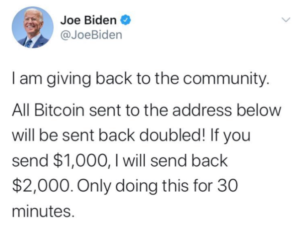
Editor’s Note: While the June 16 coordinated attack against the Twitter accounts of current Presidential candidate Joe Biden, former President Barack Obama, Kanye and Kim Kardashian West, Elon Musk, Warren Buffett, Jeff Bezos, Mike Bloomberg, and other public figures produced little tangible damage (most Tweeters sniffed out the Bitcoin fundraising hoax immediately and Twitter responded very quickly to protect impacted accounts), it brought to light the vulnerability of information sources so many use to both convey and count on for key facts. Information Professionals Association Advisor Dr. Paul Lieber, Chief Scientist at COLSA Corporation, offers us his perspectives on the broader questions and farther-reaching impacts to be addressed as a result of the attack.
“During a time period when social media is deemed a vital influence tool (being knee deep in a global pandemic, a presidential election on the horizon), there remains little discussion on the role of domestic and foreign disinformation (controlling frames of discourse via strawman arguments) and misinformation (blatant falsehoods) on public opinion formation. Most of the focus remains on the sources of disinformation and the proliferation of misinformation, rather then their effectiveness.
Last week’s Twitter attack added a new layer into the discussion, that being just how vulnerable the global information infrastructure is in tandem. This hack mocked the public in its brazenness (in that tweeted Bitcoin fundraising requests are near-laughable), and with it inserted a very real possibility that it’s only a matter of wanting to render useless real-time podiums of the world’s highest profile individuals.
As President Donald Trump famously relies on Twitter as a key messaging tool, he now does so with a blatant awareness it only loosely protects against misstatements and/or corruption of information contained within. It simultaneously begs the question: What is the next critical information cog in the crosshairs of those wishing to seed chaos? Looking deeper and perhaps more nefarious, could an entire YouTube channel be hacked and universally replaced with deepfake content?
As of today, Twitter acknowledged that of the 130 accounts targeted, 36 of the hacks included access to private (Direct) messages. A hacker interviewed on Dutch radio confirmed access to the private messages, notably of Dutch politician Geert Wilders. Wilders’ hacked account re-tweeted conspiracy theories and replaced his profile photo with controversial imagery.
Perhaps this Twitter event will alter public persona’s use of social media and/or those on the receiving end. Or not at all. It may also usher in additional government protections and restrictions for content contained within.”
In the wake of the attack, Congress has called for Twitter to share more information and is requesting briefings from industry and government on the vulnerability of the upcoming U.S. elections.
“The ability of bad actors to take over prominent accounts, even fleetingly, signals a worrisome vulnerability in this media environment,” said Democratic Senator Mark Warner, vice chairman of the Intelligence Committee, and one of the tech industry’s most vocal critics. The Federal Bureau of Investigation is also investigating the hack.
For more on how the Twitter social engineering attack was orchestrated, and by whom, see this article at The New York Times.
